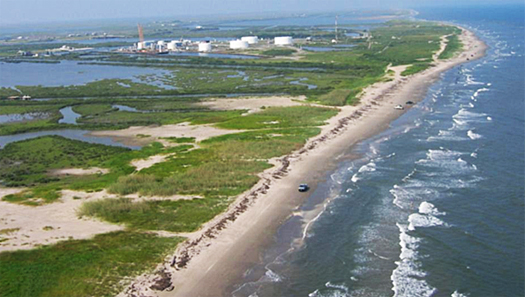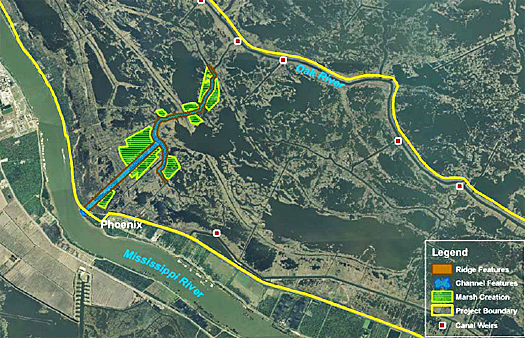Arcadis to design sediment diversion from Mississippi to Louisiana coastal wetlands
 Engineering and consultancy firm Arcadis has been awarded two contracts to help restore Louisiana’s coastal wetlands. For both projects, Arcadis US will focus on diverting valuable sediments and nutrients from the Mississippi River to start rebuilding the thousands of acres of land now being lost every year.
Engineering and consultancy firm Arcadis has been awarded two contracts to help restore Louisiana’s coastal wetlands. For both projects, Arcadis US will focus on diverting valuable sediments and nutrients from the Mississippi River to start rebuilding the thousands of acres of land now being lost every year.
The two projects together represent a potential capacity of 85,000 cubic feet per second (cfs) of sediment-rich Mississippi River waters to build up to 25,000 acres of wetlands over 50 years.
Land-building sediments from Mississippi
For the ‘White Ditch Freshwater and Sediment Diversion’ project, the U.S. Army Corps of Engineers New Orleans District selected Arcadis US to design a freshwater and sediment diversion system south of New Orleans. The goal of the program is to offset the trend of coastal deterioration brought on by years of human intervention on the river. Delivering valuable land-building sediments from the Mississippi River will help maintain the current area of marsh habitat and its ability to reduce vulnerability to coastal storms, waves and flooding.

The plannend diversion of fresh water from the Mississippi into the marches of Plaquemines Parish near White Ditch.
Rebuild barrier islands and coastal marshes
The other Arcadis US contract is for the Lower Barataria Sediment Diversion Project, part of the state of Louisiana Coastal Protection and Restoration Authority’s larger, 50 billion dollar program of coastal restoration and protection.
Intended to rebuild the barrier islands, shoreline and coastal marshes of Caminada Headland and Shell Island, the program is designed to restore both habitat and the sustainability of the shoreline itself. An integral component of the overall program, the Lower Barataria Sediment Diversion Project is expected to create between 9,000 to 12,000 acres of wetlands over a 50-year period.
Restoring coastal wetlands and natural barriers are all part of a strategy critical to the region known as America’s Wetland. Reconnecting the Mississippi River and its fresh water and sediments to the delta will help rebuild important ecosystems and their ability to make the coastal area more resilient to storms.
Flood protection and wildlife
“The coastal wetlands are more than a land mass. They are integral to the economy and culture of the region,” notes Rudy Guichard, senior vice president/director of Aracdis US “Not only do they act as part of the multiple layers of defense against storms and flooding, these areas provide the habitat for fish and wildlife that are part of Louisiana’s economic lifeblood.
Multi-faceted development with nature as dynamic engine
“As a global leader for designing sustainable coastlines and waterways, Arcadis believes in developing multi-faceted, integrated solutions to restore, protect, and enhance sensitive coastal areas. We are working with the Army Corps and the state of Louisiana to design these projects with and from nature, in effect using nature as a dynamic engine. These projects will harness the massive power of the Mississippi River to bring sediment and nutrients to the basin. You couldn’t afford to dredge the same amount in the same time.”
About Arcadis
Arcadis develops, designs, implements, maintains and operates projects for companies and governments. With 21,000 employees and more than $3.2 billion in revenues, the company has an extensive international network supported by strong local market positions.
This news item was originally published on Arcadis US
More information
Arcadis
Amsterdam, the Netherlands
+31 20 2011 011
www.arcadis.com



